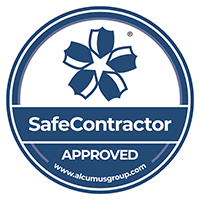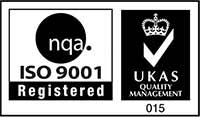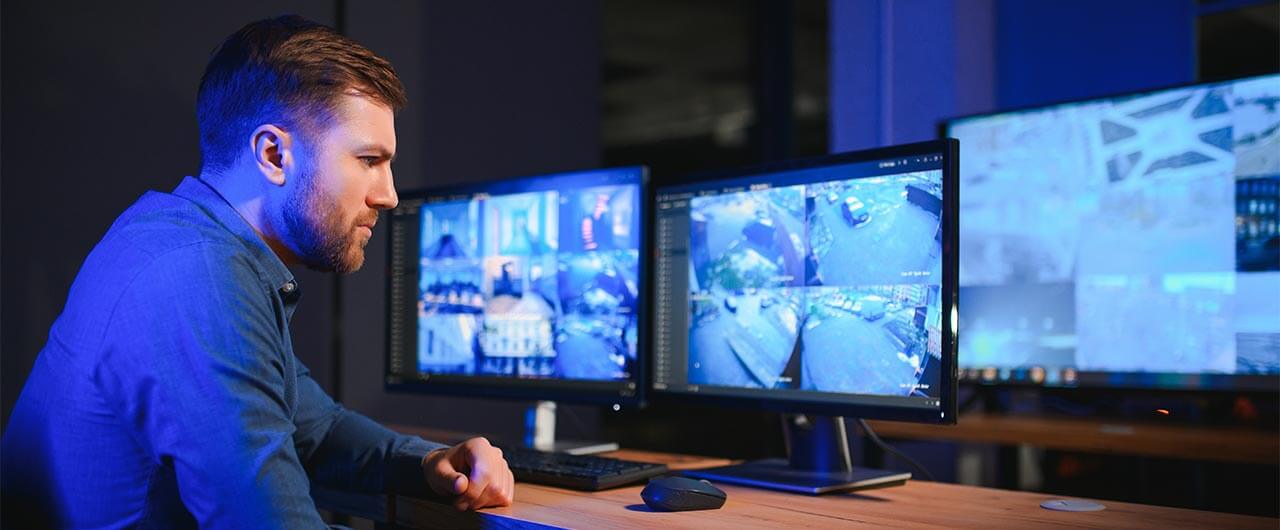In some ways, it might not seem that the argument really needs to be made for the merits of closed-circuit television (CCTV) monitoring for businesses. After all, the very initialism “CCTV” is pretty much synonymous with all things security.
Or to put it another way: individuals and organisations are already broadly aware of at least some of the things CCTV systems can do. Indeed, a given business owner or company decision-maker might already have a CCTV system at home to help deter intruders. Furthermore, the recorded footage from CCTV cameras can be instrumental in identifying wrongdoers, in the event of a criminal act occurring.
Indeed, at the time of typing, nearly a century has passed since Russian inventor Leon Theremin’s development of what many people regard as the first CCTV system. So, do we need to spell out precisely why a business in the UK might need CCTV monitoring?
The short answer is… yes, not least because the term “CCTV monitoring” doesn’t simply refer to having a CCTV system in place. The right CCTV monitoring service could play a critical role in safeguarding the business you may have worked so hard to build up – and below, we have detailed the many ways in which it can be so indispensable.
Before we proceed further… what actually is CCTV monitoring?
It is one thing to have CCTV cameras at your commercial building. But if you have monitored CCTV, this refers to an arrangement whereby you have security professionals in place, remotely monitoring the pictures your CCTV system produces.
Typically, CCTV monitoring operates as follows: the security cameras are set up, with motion sensors or infrared beams incorporated. If these sensors or beams are triggered by an intruder, an alert can be sent to a CCTV monitoring station. This serves as a prompt for the security team to look at the live footage, and to carry out whatever actions may be necessary.
When you have a remote CCTV monitoring system that has been installed by our experts at DTS London, in a scenario where an intruder is detected, the decision might be made to communicate with the intruder via audio (tannoy) to warn them off.
Depending on what becomes apparent via monitoring of the CCTV cameras, the police or fire services might be called, or certain people who need to be notified – such as yourself, if you are the business owner or another representative of your organisation – may be informed.
5 reasons why CCTV monitoring can be a superb investment for business protection
So, now that you know the essentials of how CCTV monitoring works, it’s time to consider some of the factors that help make this service crucial for a broad range of organisations across the UK. They include, in no particular order of importance:
1. CCTV monitoring can help deter intruders from committing a crime in the first place
The cost of a CCTV monitoring arrangement might be one factor that causes a business owner to hesitate to commit to one. However, this cost may pale into comparison with a situation where a crime does occur due to the lack of a CCTV system to put off the miscreant.
Did you know that according to the findings of the UK Government’s Commercial Victimisation Survey in 2022, an estimated 28% of all business premises had been a victim of crime during the previous 12 months? The most common form of crime experienced was theft (15%), followed by burglary including attempted burglary (9%), vandalism (9%), and assaults or threats (7%).
Furthermore, almost seven in 10 (67%) victims of crime polled for the same survey, reported some degree of financial impact from the crime they experienced. In the case of a small proportion of victims, the financial impact was severe enough to result in them considering the permanent closure of their premises.
You can probably begin to see, then, why great numbers of businesses in the UK have come to regard CCTV monitoring as an essential – or close to essential – service. When people who wander onto your business premises notice your active CCTV cameras or are made aware over tannoy that they are under surveillance, they are likely to be deterred from committing what could be a costly crime for your organisation.
2. CCTV monitoring can enable a rapid and appropriate response
Let’s presume that a given intruder – even after being told over the tannoy system that they are being watched – proceeds to commit a crime at your business site regardless. This isn’t impossible – after all, they might be covering their face in some way to try to avoid identification, or they may simply be determined to cause some form of damage at your premises.
As we referenced above, though, CCTV monitoring isn’t simply about having some CCTV cameras set up; it can serve as a true 24/7 solution for your organisation’s security.
Even in a situation like the aforementioned of the intruder acting particularly boldly, because your remote CCTV monitoring system will be set up to react when it detects any signs of movement at your premises, you can be sure of any illegal activity being noticed almost immediately.
It won’t be a case, in other words, of your staff turning up the following morning and only discovering your business has been burgled (or worse) due to the scene of devastation they are confronted with.
Your business premises can be monitored throughout the day and night, including weekends, using an effective CCTV monitoring system. The rapid detection of suspicious or unlawful activity will also allow for the fastest possible – and most appropriate – action to be taken to minimise risks to your business. These responses could include the police or fire services being called, as well as the sending of real-time alerts to your phone or email inbox.
Does a company need a CCTV policy?
Yes, if you intend to install CCTV at your organisation’s premises, you will need to have a CCTV policy. This will enable you to achieve compliance with data protection rules and avoid receiving fines from the Information Commissioner’s Office (ICO).
Given that CCTV footage contains personal data, it is imperative that your company is aware of its obligations in relation to how this data is managed. The General Data Protection Regulation (GDPR) – a European Union (EU) privacy law that was incorporated into UK law after Brexit – imposes restrictions on the use of CCTV.
So, the CCTV policy that your company implements can greatly help demonstrate your intention to adhere to data protection rules. An important principle under these rules is that a business should only use CCTV if it can explain the benefits of doing so.
Your organisation’s CCTV policy should encompass the below points:
- Confirmation that all information your CCTV system records will be stored securely and kept only for as long as necessary
- Explanation of the exact purpose of your business having a CCTV system
- A statement of the areas your CCTV system covers
- Explanation that appropriate signage has been placed around the premises, reminding people of the CCTV cameras’ presence
- Confirmation that you will give staff advance notice prior to adding further CCTV cameras; and
Provision of contact information for the data controller (who is the individual in charge of the information on your business’s behalf).
3. CCTV monitoring saves you from having to invest in on-site security personnel
You could, of course, arrange to have security guards present in person at your site, if you are concerned about risks such as burglary and/or property damage.
However, with escalating costs being a major source of worry for UK businesses right now, you might not have the room in your budget to easily pursue this approach. This will be particularly likely if your business has multiple sites for which effective security is needed.
In such circumstances, a well-designed CCTV monitoring solution can be an excellent cost-effective alternative to on-site security personnel. After all, you won’t need to have human beings constantly watching over your CCTV footage; instead, the motion sensors or infrared beams – linked to your system’s broader CCTV security software – will do the work of monitoring for movement.
In the event of movement being detected, the system will be triggered, and human CCTV monitoring controllers can be prompted to look at the footage. On the basis of what they see through the CCTV cameras, they will be able to take the most suitable actions.
4. CCTV monitoring can drive down your business insurance costs and simplify the claims process
The newly installed CCTV monitoring system at your business premises could pay for itself over time, in ways you might not initially think of.
Consider, for example, how the mere fact of having monitored CCTV installed at your property will make your commercial property less of a break-in risk, in the eyes of insurers. If insurance companies perceive your organisation’s premises to be a lower security risk than would be the case in the absence of the CCTV system, they will consider you as less likely to make a claim on your insurance policy with them.
So, you could access lower business insurance premiums if you have the right CCTV monitoring system in place at your premises. Month by month, you could be benefitting from savings that will help cover the cost of the CCTV system.
It is worth bearing in mind, too, that if you do need to make a claim on your insurance despite the presence of a CCTV system, the availability of footage will enable the insurer to verify your claim. Your insurance company can use the footage to confirm your claim is a valid one that should be paid. The footage will constitute clear, timestamped evidence of the incident giving rise to the claim, thereby allowing for a much-simplified insurance claims process.
Let’s imagine an alternative scenario in which you don’t have a monitored CCTV system in place. Not only would you probably be paying more for your business insurance, but when a claim needs to be made on the policy, the insurer might be likelier to refuse the claim. Both of these would be financial drains on your business, potentially compromising its operations, and maybe even your company’s chances of survival.
5. CCTV monitoring helps keep on-site staff safe, too
It is often said that “a business is its people” – and there is no question that your company’s talented staff will be its most treasured resource. So, protecting your business is effectively about protecting your personnel on-site, too.
Having a monitored CCTV system installed can greatly contribute to keeping your staff safe – not only from threats that outsiders may pose, but also from any other employees who may put them in danger.
In short, your CCTV monitoring infrastructure can play an imperative role in promoting a positive and safe working environment for every member of your company’s team.
Do you have to tell customers you have CCTV?
Yes, one of the requirements if your UK business installs CCTV, is letting people know they are being recorded. These people encompass both employees and customers of your business.
This obligation is usually fulfilled by displaying signs at the given business premises. The signs must be clearly visible and readable, and they should be prominently displayed at all entry points.
Contact details should also be provided on the signage for those who wish to get in touch to receive further information. In light of this, you should make sure your staff members know what to do in the event of someone enquiring about your company’s CCTV system. The GOV.UK website provides additional details on the data protection requirements applicable to organisations intending to set up a CCTV system at their premises.
Make DTS London your choice for CCTV monitoring solutions in London or nearby
Have you been convinced about the merits of a monitored CCTV system at your business premises? If so, it could be time for you to learn more about our sophisticated products and the genuinely 24/7 security we could give you the benefit of, here at DTS London.
Simply call our experts on 0208 090 7485 today to learn more, or request a free site survey using our straightforward online contact form.






